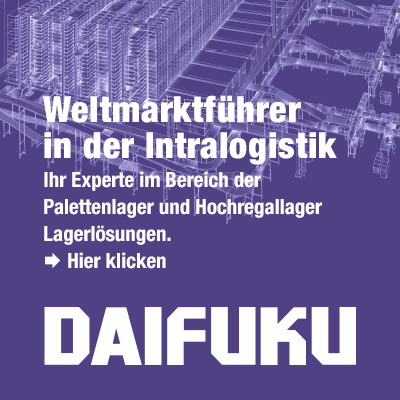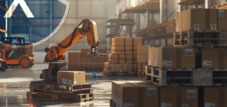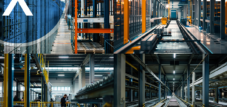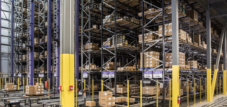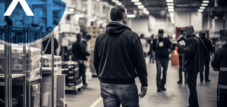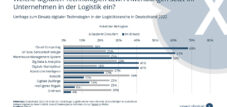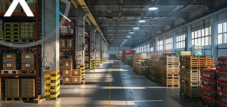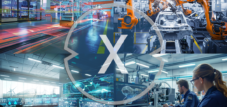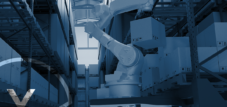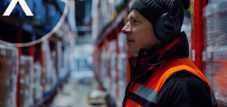Automated logistics and intralogistics: Which technology, which product and which system to use for modern warehousing?
Language selection 📢
Published on: July 24, 2024 / update from: July 24, 2024 - Author: Konrad Wolfenstein

Automated logistics and intralogistics: technologies, products and systems for modern warehousing - Image: Xpert.Digital
📦 Automated logistics and intralogistics: technologies, products and systems for modern warehousing
🌐 Digitalization in logistics is still a dominant topic in the media and companies. The focus is particularly on the automation of storage and material flow processes. The lack of qualified personnel and skilled workers is increasingly causing major problems for many companies and in some cases even leads to situations that threaten their existence. For this reason, companies are increasingly looking for automated systems for their intralogistics.
🔧 Challenges of modern intralogistics
At first glance, more efficient warehouse processes and a simultaneous shortage of skilled workers seem to be contradictory goals. But innovative technologies for automating warehouse processes already offer solutions for many different use cases. It doesn’t always have to be a big investment. Even cheaper systems today offer many opportunities to accelerate your own warehouse processes and achieve high levels of service even with few staff.
🚀 Warehouse automation technologies
The range of technologies used in modern warehousing is impressive, ranging from simple conveyor belts to complex robotic systems. Here are some of the most important technologies currently used in intralogistics:
Automatic storage and retrieval systems (AS/RS)
These systems are designed to store items efficiently and retrieve them quickly when needed. You can make optimal use of warehouse space and reduce the need for human labor.
Conveying technologies
Conveyor belts, roller tracks and similar technologies enable the efficient transport of goods within the warehouse. They can be simple or highly complex, depending on the needs of the company.
Robots and drones
Robots perform a variety of tasks in modern warehouses, from picking to packing. Drones are increasingly being used for inventory tasks and condition checks.
Automatic Guided Vehicles (AGVs)
These driverless transport systems are used to transport materials within a warehouse. They are flexible, scalable and can be tailored to a company's specific needs.
📈 Advantages of automation
The automation of intralogistics offers numerous advantages that go far beyond simply saving labor. These benefits include, but are not limited to:
Increased efficiency and productivity
Automated systems can work continuously and without breaks. This leads to a significant increase in efficiency and productivity in warehouse operations.
Error reduction
Human error is one of the main causes of warehousing problems. Automated systems can minimize these errors and thus increase the accuracy and reliability of warehouse processes.
Scalability
Automated systems are flexible and can be easily adapted to changing requirements. This is particularly important in industries with highly fluctuating order volumes.
Cost savings
Despite the initial investment, automated systems can provide significant long-term cost savings. This results from lower personnel costs, reduced error costs and better use of space.
🏷️ Products and systems for intralogistics
Some of the most innovative products and systems currently available on the market include:
Pick-by-light and pick-by-voice systems
These technologies support the picking of goods by providing employees with visual or acoustic instructions. This speeds up the process and reduces errors.
Warehouse management systems (WMS)
These software solutions offer comprehensive control and monitoring of all warehouse processes. They optimize warehousing, improve inventory accuracy and increase efficiency.
Mobile robots
These robots are particularly flexible and can take on a variety of tasks in the warehouse. They navigate autonomously and can be easily adapted to changing requirements.
📊 The role of data and IoT in warehouse automation
The Internet of Things (IoT) has revolutionized warehouse automation. Sensors and networked devices enable continuous monitoring and control of warehouse processes. Real-time data provides valuable insights that can be used to optimize inventory management. Some application examples are:
Real-time inventory management
With the help of IoT sensors, companies can monitor their inventory in real time. This reduces the risk of inventory errors and enables more precise planning.
Prediction-based maintenance
Sensors monitor the condition of machines and equipment. Potential problems can be identified early and resolved before they lead to major failures.
Optimization of energy consumption
Networked systems can monitor and optimize energy consumption in the warehouse. This results in cost savings and supports sustainable practices.
🌟 Challenges and future prospects
Despite the many benefits, there are also challenges when implementing automated systems. High initial investments, technological complexity and the need to adapt existing processes are just some of the hurdles that companies must overcome. But the benefits typically outweigh the challenges, especially when long-term savings and efficiencies are taken into account.
The future of intralogistics promises further innovations and progress. Increasing integration of artificial intelligence (AI) and machine learning will take automation to new levels. These technologies will be able to not only automate tasks, but also make decisions and optimize processes.
🔍 Future viability of automation
The automation of intralogistics is an essential factor for the future viability of companies. Given the skills shortage and increasing competitive pressure, automation offers both short-term and long-term benefits. Companies that invest in these technologies early on and optimize their warehouse processes will be able to survive better in an increasingly digitalized and automated world. Choosing the right technology, the right product and the right system is crucial for success. It is therefore worth planning carefully and obtaining comprehensive information in order to find the best possible solutions for your individual requirements.
📣 Similar topics
- 🌐 Digitalization in logistics: Automated intralogistics for the future
- 🔧 Challenges and solutions in modern warehousing
- 🚀 Robots, drones and AGVs: warehouse automation technologies
- 📈 Efficiency and error reduction through warehouse automation
- 🏷️ Intelligent picking and warehouse management systems
- 📊 Use of data and IoT to optimize warehouse processes
- 🌟 Future prospects of intralogistics: AI and machine learning
- 🔍 Decision criteria for selecting automated systems
- 💼 Competitive advantages through automation in intralogistics
- 🏭 Industry 4.0: The transformation in warehousing
#️⃣ Hashtags: #Intralogistics #warehouse automation #digitalization #Industry4.0 #futurecapability
Xpert partner in warehouse planning and construction
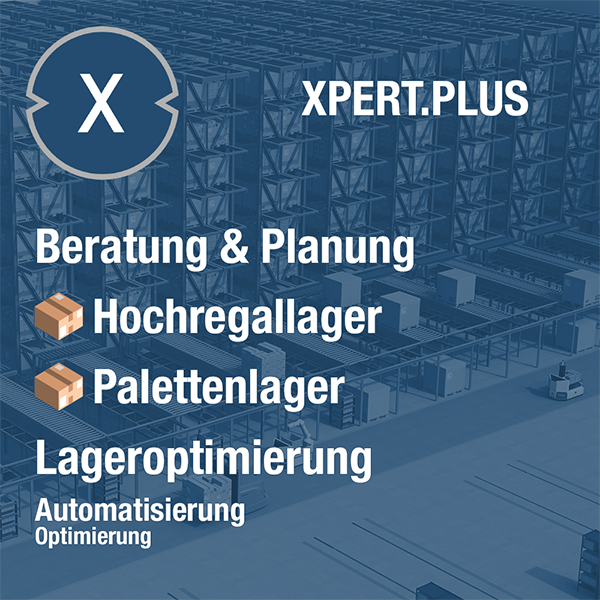
Xpert.Plus warehouse optimization - high-bay warehouses such as pallet warehouses consulting and planning
We are there for you - advice - planning - implementation - project management
☑️ Smart City & Factory: Industry expert for energetic 5G buildings and halls as well as advice and installation of solar systems
☑️ Xpert.Plus - logistics consulting and logistics optimization
☑️ Industry expert, here with his own Xpert.Digital Industry Hub with over 2,500 specialist articles
I would be happy to serve as your personal advisor.
You can contact me by filling out the contact form below or simply call me on +49 89 89 674 804 (Munich) .
I'm looking forward to our joint project.
Xpert.Digital - Konrad Wolfenstein
Xpert.Digital is a hub for industry with a focus on digitalization, mechanical engineering, logistics/intralogistics and photovoltaics.
With our 360° business development solution, we support well-known companies from new business to after sales.
Market intelligence, smarketing, marketing automation, content development, PR, mail campaigns, personalized social media and lead nurturing are part of our digital tools.
You can find out more at: www.xpert.digital - www.xpert.solar - www.xpert.plus



